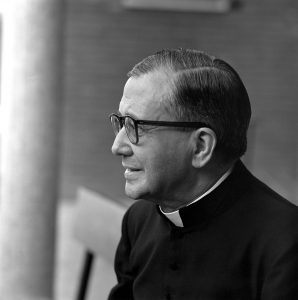I once found a hilarious video on YouTube, and then sent it to a guy I know. I talked to him later that day, and asked, “Did you watch the video?” He replied, “Nope, I don’t watch videos during work.” I was humbled. I thought I was a disciplined person, but this guy is more disciplined. No wonder he’s such an amazing person and leader.
[Listen to Fr. Justin’s homily here.]
 When I was 16, the first time I went to visit the seminary in Mission, I was in awe of the monks. They lived a different kind of life: They woke up at 4:45 a.m. and prayed for two hours straight. When I watched them praying in silence in the church, their discipline inspired me; I wanted to be like that.
When I was 16, the first time I went to visit the seminary in Mission, I was in awe of the monks. They lived a different kind of life: They woke up at 4:45 a.m. and prayed for two hours straight. When I watched them praying in silence in the church, their discipline inspired me; I wanted to be like that.
Finally, I once had lunch with a national director from Alpha and he was talking about a problem in his life, so I suggested that he make priorities for every day. He said he already did that. “Of course,” I thought, “This guy is at another level of living.”
Unfortunately, most of us aren’t like this. We do what we feel like doing during the day—we’re slaves to our whims. But people who live a better, holier kind of life have certain commitments that guide them through the day: They have priorities, times for prayer, and rules to guide their work.
For the past two weeks, I’ve been inviting everyone to commit to 15 minutes of adoration a week. We only have 117 people signed up so far (thanks to those who have!), probably because there’s a hesitancy about commitments and a fear of failing. Let me remind you: It’s not what I want from you. It’s what I want for you. I’m not inviting you to make a commitment for myself. It’s for you and your benefit.
In the Second Reading, St. Paul writes, “For freedom, Christ has set us free. Stand firm, therefore, and do not submit again to a yoke of slavery… For you were called to freedom… only do not use your freedom as an opportunity for self-indulgence, but through love become slaves to one another” (Gal 5:1,13). Jesus has set us free, but what kind of freedom has He given us? St. Paul says it’s not freedom for self-indulgence—that’s an abuse of freedom. He tells us instead to become slaves to one another, because it’s okay to be a slave to what’s truly good—that’s what we call discipline.
 Four years ago, we talked about being free, but the questions are: Free to do what? Are we free to do what’s good? Is Canada a free country? We’re free from being sold into slavery, but many of us are slaves: We can’t say “No” to our own cravings. Hundreds of thousands of men are slaves to pornography: They couldn’t stop if they wanted to. Most of us now are slaves to our phones: We feel incomplete without them.
Four years ago, we talked about being free, but the questions are: Free to do what? Are we free to do what’s good? Is Canada a free country? We’re free from being sold into slavery, but many of us are slaves: We can’t say “No” to our own cravings. Hundreds of thousands of men are slaves to pornography: They couldn’t stop if they wanted to. Most of us now are slaves to our phones: We feel incomplete without them.
When we get married, are we freer? Yes, free to love our spouse, have a family, and have amazing relationships. We don’t have that freedom when we’re single, but we have a greater freedom to serve other people! And, if we’re celibate, then we have a freedom to love God in ways that others don’t.
The question always is: Free to do what? Are we free to do the good? Jesus says, “‘If you continue in my word, you are truly my disciples, and you will know the truth, and the truth will make you free.’ [The Jews] answered him, ‘We are descendants of Abraham, and have never been in bondage to anyone. How is it that you say, “You will be made free”?’ Jesus answered them, ‘Truly, truly, I say to you, everyone who commits sin is a slave to sin’” (Jn 8:31-34).
 Most children don’t have the freedom to say the truth always. Early on in life, we tell our first lie to get out of trouble. Then we realize we can sometimes not get caught, and so get really good at it. After a while, we instinctively lie to make ourselves look good, not to hurt people’s feelings, or to avoid conflict. And if you ask us to tell the truth, in order to help someone grow or necessarily confront an uncomfortable situation, we can’t, because we’re slaves to sin.
Most children don’t have the freedom to say the truth always. Early on in life, we tell our first lie to get out of trouble. Then we realize we can sometimes not get caught, and so get really good at it. After a while, we instinctively lie to make ourselves look good, not to hurt people’s feelings, or to avoid conflict. And if you ask us to tell the truth, in order to help someone grow or necessarily confront an uncomfortable situation, we can’t, because we’re slaves to sin.
Jesus always asks us for commitment, because He wants something for us. In the Gospel today, someone says to Him, “‘I will follow you, Lord; but let me first say farewell to those at my home.’ Jesus said to him, ‘No one who puts a hand to the plough and looks back is fit for the kingdom of God’” (Lk 9:61-62). Jesus is saying that following Him, because He’s God, requires absolute commitment, even greater than that given to our families. He uses exaggeration: If someone says they have to say “Goodbye” to their parents first, they’re postponing their commitment, and that’s equivalent to rejecting Him. However, once we make the commitment to follow Jesus without compromise, then we’ll be free to love. As we’ve said before, if we put Jesus above our family, we’ll be more patient, forgiving, and loving towards them.
As your priest, I’ve noticed one thing in particular. Most of you have lots of ups and downs in life: You do really well for a time, and then go through a crisis when you question things, don’t feel close to God, and then move away from Him. There are some people in our community that used to be here but aren’t anymore because they’ve given up. What they need more of are the commitments to get them through the crises.
Sometimes during crises the only thing that holds marriages together is commitment, because the good feelings are gone and both spouses are hurting each other, and the only thing that will prevent them from making a big mistake is their vows—that commitment will direct them to take the right steps: to forgive, improve, get help, and then rebuild. You will only go as far as your commitments. If we want to get in shape, we’ll only go as far as our commitment to food, sleep, and exercise, because half the time, we won’t feel like pushing our bodies to the maximum.
Someone told me that St. Josemaría Escrivá, the founder of Opus Dei, told people that their daily spiritual commitments are like the sticks connected to fire hydrants in areas like Quebec where there’s lots of snow. During snowstorms, the hydrants are covered, but the sticks show where they are. So, when we’re in crises, the commitments show us where the solutions are! And please help our brothers and sisters who aren’t here right now. Listen and support them, and help them make commitments.
I wish all of you had firm commitments to prayer, then you’ll have the freedom to stay close to God for life!
Let’s go over the adoration commitment. How much time are we suggesting? 15 minutes a week, because that’s the time we need to enter into prayer (Fr. Jacques Philippe, Time for God, 83). Can it be done in any chapel or church? Yes. Does it have to be the same time every week? No. It’s whenever you can make it. Then why does the website ask us to sign up for a certain hour? Because the system is new and not that agile; the website designers will improve that; this is the best system out there right now. Remember, we’re asking for sign-ups to change the culture of our community. So, I can go anytime to any church during the week? Yes!
Don’t worry about failure! Because God wants a relationship with us, it’s better to commit to 15 minutes with Jesus and fail, than never commit and never show up at all. When it comes to spending time with Jesus, missing a high bar is better than reaching a low one. Failure at trying to love Him more, is better than not even trying to love Him more. Most of you are ready for this and will do wonderfully!
To sign up, you can go to stanthonyvan.weadorehim.com, or use the cards in your pews. By the way, I’ll teach you how to pray in adoration in upcoming homilies. In the bulletin today, there’s a handout called, “48 Things to Do at Adoration.” It’s absolutely brilliant: It just tells us what we can do and how to do it, and this can last for a lifetime.
Imagine if Jesus announced to thousands of people in visions that He was going to come in the flesh on a certain day, and appear at B.C. Place Stadium. He would come to tell us that He loves us, how to improve, and tell the world what it most needed to hear. So many people, even non-Catholics, had the vision that they started reporting it internationally. Hundreds of millions would come to Vancouver. All of us would go, too.
And during the event, the world would stop, listen, and watch. Imagine afterwards He’d say that He wanted to speak privately with a few people, and He selected us. Could you imagine how blessed we’d be? And, while in private, we’d be mesmerized. We’d be able to ask Him questions and get answers to our problems. And He’d hug each one of us. Then He’d invite us to come back every week for 15 minutes. No matter what was going on in our lives, we’d always go. And, no matter the crisis, we’d receive everything we need: love, support, guidance, challenge, and grace!
This is what Jesus wants for us. Commitment to that time would give us true freedom.

